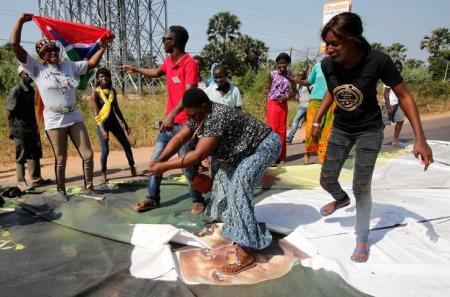
By Emma Farge
BANJUL (Reuters) – Gambians reacted with joy and stunned disbelief on Saturday to the defeat of President Yahya Jammeh, one day after he conceded that he lost an election set to end his 22 years in power.
Jammeh’s government is accused of crushing dissent and torturing opponents and he had said he would rule for a “billion years”. As a result, few believed he would allow himself to lose Thursday’s vote against opposition candidate Adama Barrow.
But in an address on state-owned radio on Friday evening, Jammeh accepted results announced by the electoral commission showing his defeat in a move that stunned observers across the continent and sparked wild celebration in the capital Banjul.
“I feel different and when we woke up people were happy. How we are free to say everything we want to say,” said Yacouba Cisse, 34, a fisherman who was still wearing a pink whistle from overnight celebrations in the capital.
A van packed with opposition supporters banging drums rolled through the streets on Saturday and many people were still wearing opposition coalition T-shirts from the night before.
Despite a heavy police presence there were few signs of tension or hostility, witnesses said.
“I will only believe it (Jammeh’s defeat) when I see him leaving state house. He still controls the army and his family are the top brass,” said a businessman, who asked not to be named.
Entrenched rulers such as Jammeh rarely lose elections in Africa so the result came as a shock, particularly given that other African leaders have since last year changed their country’s constitutions to prolong their rule.
Official results in the West African country of 1.8 million gave Barrow, a real estate developer who once worked as a security guard at retailer Argos in London, 45.5 percent of the vote against Jammeh’s 36.7 percent.
Jammeh’s supporters deny abuses and he has often criticized Western powers for meddling in African affairs.
Barrow was in a meeting at his house on Saturday as supporters gathered outside, witnesses said. Expectations are high among his supporters for an end to human rights abuses and for job creation.
“We expect him to remedy the ‘back way’. We want him to create jobs for youths. Most of us are frustrated,” said farmer Harouma Diallo, 29. The ‘back way’ is a Gambian description of the route illegal migrants take from the country to Europe.
U.N. Secretary General Ban Ki-moon and European Union foreign policy chief Federica Mogherini both commended Gambia’s people for the election and said their institutions were ready to support the country.
(Writing by Matthew Mpoke Bigg; Editing by Toby Chopra)